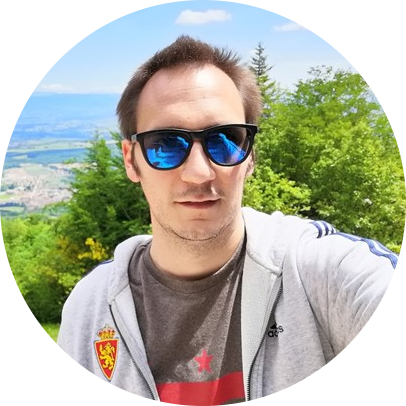
Although he was born in Zaragoza, the childhood and adolescence passport of Rubén, an experimental physicist enthusiastic about learning and progress, embraces lots of stamps from both Atlantic’s shores. How to consider yourself belonging to a certain place if your nature of globetrotting?
Rubén was born the same year that Bruce Springsteen, a rock legend to whom his mother approached at an early age, won the Brit Award for International Solo Artist. He left the maños and the Ebro two years later to settle in the Spanish capital, but just for a couple of years. From the 4th to the 7th birthday, Rubén grew up in a paradise: San Diego, in California (USA), where he remembers taking baths on the beach every 31st of December, and the miniature train of Balboa Park. He came back to Madrid, the city that would end up becoming his usual intermittent destiny, and when he was 12 years old, Rubén’s family moved to Munich (Germany).
It was 1998 then, and, not so far from there, Ernst Jünger died. The German philosopher was invested doctor honoris causa by the Complutense University of Madrid, where Rubén, on his return to the capital, would study a degree in physics, although, emigrating in the last year to Rome (Italy) by the hand of a Erasmus scholarship. He came back to Madrid to do a master’s degree in nuclear physics and high energies and, a year later, in 2010, he gained momentum to jump again, this time to Leiden (Netherlands), where he began his professional career at the European Space Agency (ESA).
From there, a little bit like the main characters of Cien años de soledad, to whom “todas las cosas buenas que les ocurrieron en su larga vida”, derived from the change, Rubén arrived to Geneva, his most perennial destination. He has been for almost 9 years in the city of the watches and the international organizations.
Rubén works at CERN. He is part of the R2E (Radiation to Electronics), which seeks to identify and mitigate the failures caused by radiation, in the machinery of the LHC, the world’s largest and most powerful particle accelerator.
For Rubén, beauty is defined by its practicality. Something is beautiful if it has objective characteristics that are useful or convenient. This experimental physicist opts for a beauty friendly to progress, willing to help us as individuals and as a society. The beautiful dwells in the Aristotelian virtue, in always going beyond.
He agrees with the Madrid poet, Dámaso Alonso, that the motor that drives the world is passion, it is placing heart in our actions. That is why, at the pace of Thunder road, Rubén dreams of continuity: the continuity of learning, of facing new challenges time and time again and, above all, the continuity of doing something that truly excites him.
Even if he was lame, Rubén would go earlier to the tavern of knowledge than to mass, because in life, as in the fictitious Macondo, “lo esencial es no perder la orientación” y Rubén knows where he wants to go.
Back to the HiLumi Beehive | WP10 bees

